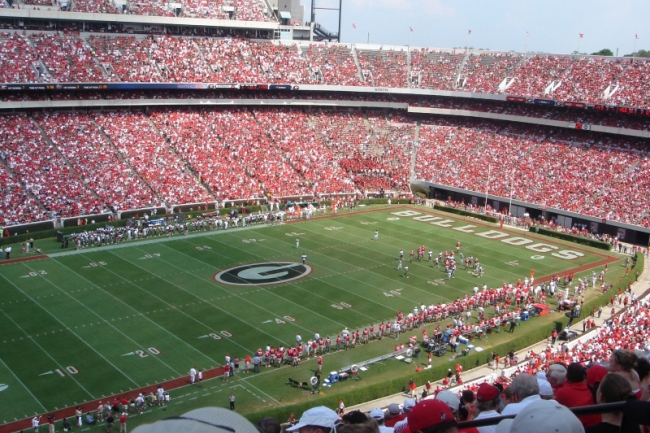The tax story in Billion Dollar Ball: A Journey Through the Big Money Culture of College Football by Gilbert Gaul is not even the most interesting part of the book. Still it is a great story.
“If you live inside the bubble of college football, writing a large check to lock down a seat at your favorite college stadium and then getting to deduct 80 percent of the amount from your taxe s, feels normal. But if you happen to reside outside that zip code, the seat donation scheme probably feels strange, even wrong.
The book seems to be generating a lot of interest and was recently reviewed in the New York Times and the Washington Post. The problem the book addresses is the way in which a large influx of football dollars has diverted major colleges from their primary mission, which is, you know, education. I have this fear that the book’s popularity is going to have an effect similar to John Oliver’s recent expose of evangelists – a call for the IRS to fix something that Congress wants to stay broken.
Seat Donations
There is a general rule that says that if you get something in exchange for a donation to a charity, your deduction is reduced by the fair market value of what you received. The seat donation system was a clever way to dodge that rule. You don’t get tickets in exchange for your donation, but the right to buy tickets to the better seats is reserved for donors who meet certain thresholds.
As this practice grew in popularity the IRS eventually caught on and in 1984 issue a ruling (Reveue Ruling 84-132) that described such a program
“Taxpayer, an individual, made a payment of $300 to a particular athletic scholarship program maintained by a university, an organization described in section 170(c)(2) of the Code. This payment entitled the taxpayer to become a “member” of the program. The only benefit afforded members is that, for an additional $120, they are permitted to purchase a season ticket to the university’s home football games, with preferred seating. Preferred seating means merely that the season ticket will be for a seat between the 40 yard lines. No tickets for seats between the 40 yard lines are available to nonmembers of the program. The $300 membership fee is paid annually, and a member is required to make a separate $300 payment for each season ticket the member purchases. There are approximately 2,000 people on the waiting list to become members, and a person is made a member only when a season ticket between the 40 yard lines becomes available.
The ruling held that the $300 was not deductible except to the extent that the right to purchase a premium seat was worth less than $300.
Under Congressional pressure, IRS withdrew the ruling for further study. The resulting Revenue Ruling 86-63 had some bells and whistles to it, but left the fundamental holding of Revenue Ruling 84-132 intact. There is a story of an attempt to insert language into the Tax Reform Act of 1986 to carve out an exemption from the ruled that would have only applied to Texas and Lousiana, but apparently somebody, perhaps a Notre Dame fan, caught on and that was excised from the landmark legislation. In the end, Section 170(k) was added to the Internal Revenue Code in 1988 allowing an 80% deduction for the benefit of an educational organization when:
such amount would be allowable as a deduction underthis section but for the fact that the taxpayer receives (directly or indirectly) as a result of paying such amount the right to purchase tickets for seating at an athletic event in an athletic stadium of such institution
In 2012 a story in BloombergBusiness – Football-Ticket Tax Break Helps Colleges Get Millions – estimated the revenue loss from the deduction at $100 million.
Tax Exempt Status And Head Coach Salaries
A more interesting question is whether the money making sports programs should be exempt at all. Even if they don’t blow up the exemptions of the sponsoring institutions that are essentially allowing their brand to be used in an enterprise only vaguely related to their educational mission. Should profits from the big money sports be subject to Unrelated Business Income Tax. Perhaps the multi-million dollar salaries of head coaches (Nick Saban of Alabama currently leads the pack at over $7 million) could be considered “excess benefits”.
Gaul discussed these issues with John Colombo, a law professor at the University of Illinois. Here is the thing. I picked up Billion Dollar Ball because Paul Streckfus of EO Tax Journal recommended it. I really enjoyed the non-tax stuff in the book, but if you are a really pure tax geek what you really want to read is Professor Colombo’s article – The NCAA, Tax Exemption and College Athletics- which is available as a free download.
Colombo’s analysis indicates that there is not much the IRS can do under existing law to address the issues. It is important to keep in mind that many of the largest football programs are not even 501(c)(3) organizations, rather they are arms of state government, which raises touchy constitutional issues (Gaul notes that college football coaches are the highest paid public employees in virtually every state in the country).
Professor Colombo believes that reformers who hope to use existing tax law to attack the problem don’t really have much to work with.
… current law makes it virtually impossible for the IRS to withdraw exemption either from the NCAA or universities operating major athletic programs. It is somewhat more plausible that the IRS could tax revenues from Division I football and/or basketball under the UBIT, although even that course of action would have to scale considerable legal hurdles. Moreover, even if the IRS applied the UBIT to big-time athletic revenues, this course of action may not have much benefit to the reform movement. Evidence suggests that this action might be largely a “paper tiger” because virtually none of these programs would have taxable income in the tax accounting sense after applying appropriate tax accounting….
When it comes to the coach salaries:
The regulations under Section 4958 make abundantly clear that (1) reasonable compensation is determined based upon an employee’s entire compensation package and that (2)the “reasonableness” of compensation is measured by what the market is paying for similar services including the for-profit market. Thus whether Nick Saban’s and John Calipari’s salaries are “reasonable” depends not only on the market for other Division I coaching jobs at similar high-profile football and basketball programs but also on what NFL and NBA coaches make.
Professor Colombo does note that none of the various theories that tax scholars have come up with to justify the benefits of tax exemption really apply to big-time college athletics. He suggests that Congres, which is as football-obsessed as the rest of us, would be justified in placing some conditions on continued exemption such as capping coaches salaries or limiting annual expenditures on recruiting and facilities.








